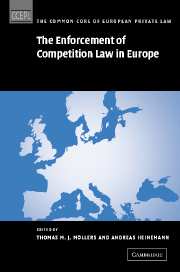Book contents
- Frontmatter
- Contents
- Preface
- Contributors to the volume
- Abbreviations (including legislation)
- Introduction
- Part I Remedies in Unfair Competition and Consumer Protection Law
- Part II Remedies in Antitrust Law
- A Introduction
- B Private enforcement of competition law: a comparative perspective
- C Case studies
- D Conclusions
- Outlook: the link between unfair competition law and antitrust law
- Bibliography
- General index
- Index by state
D - Conclusions
Published online by Cambridge University Press: 29 June 2009
- Frontmatter
- Contents
- Preface
- Contributors to the volume
- Abbreviations (including legislation)
- Introduction
- Part I Remedies in Unfair Competition and Consumer Protection Law
- Part II Remedies in Antitrust Law
- A Introduction
- B Private enforcement of competition law: a comparative perspective
- C Case studies
- D Conclusions
- Outlook: the link between unfair competition law and antitrust law
- Bibliography
- General index
- Index by state
Summary
The overall results of the country reports
The country reports allow the conclusion that – although there is everywhere the theoretical possibility to pursue private remedies for antitrust law infringements – this possibility is rarely availed of in practice. Antitrust law is primarily used as a means of defence, for example where contractual claims are contested by relying on the invalidity of contract under antitrust law. However, the active use of antitrust law is only to be seen in individual cases. Examples of the (successful) enforcement of compensatory clams are almost entirely missing. In recent times, however, a change may be observed: in the wake of the particularly blatant vitamin cartel, private compensatory claims have been pursued in certain EU Member States. In addition, the readiness seems to be growing everywhere to undertake private legal action against antitrust infringements.
There is a variety of reasons for this discrepancy between theory and practice. In part there are legal difficulties, for example restrictions on standing or uncertainty regarding the precise requirements of a compensatory claim, for instance the admissibility of the passing-on defence. The most significant causes, however, are of a practical nature, thus difficulties in providing evidence or a lack of incentive to expose oneself to the costs and risks of a private claim. Also of fundamental importance is the competition between private legal remedies and public enforcement. The applicant incurs no costs by involving an antitrust authority.
- Type
- Chapter
- Information
- The Enforcement of Competition Law in Europe , pp. 637 - 658Publisher: Cambridge University PressPrint publication year: 2008



